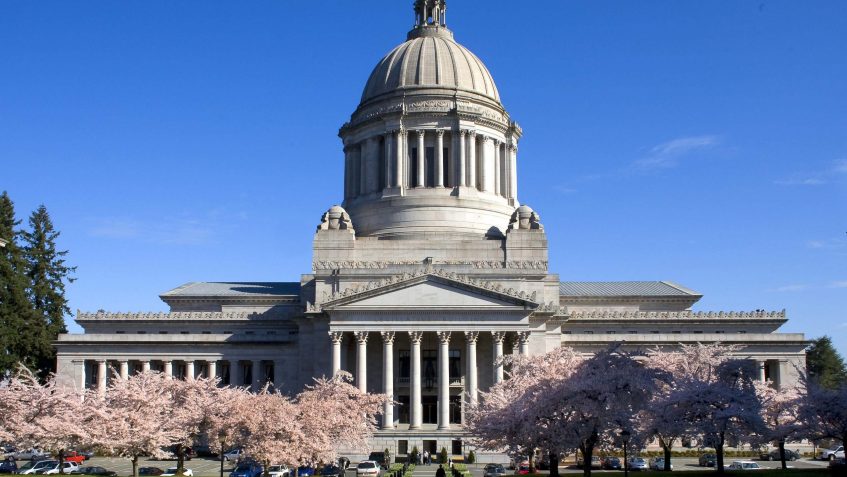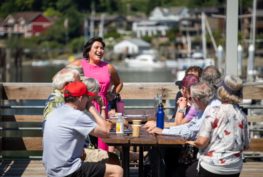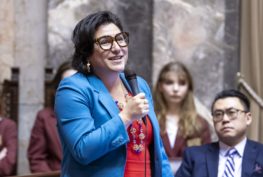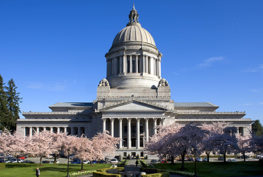Friends, neighbors—
ICYMI (in case you missed it!): Having served as Acting Chair of Higher Education and Workforce Development for most of this interim, I received the unanimous support of my caucus to officially chair the (best!) committee next session. It will be official official when the full Senate votes on January 13th, but I haven’t wasted a minute getting to work.
Over the spring, summer, and fall I have visited 19 campuses in our incredible higher education system — from community and technical colleges to big state universities and independent colleges. Each visit has been a blast! I’ve focused on meeting passionate students doing ground-breaking work, and talking with faculty and staff about the cutting-edge educational opportunities they offer. Our higher education system is preparing tomorrow’s engineers, teachers and health care providers, electricians and welders, sculptors and builders, activists and legislators, ministers and CEOs — as well as the thought leaders who will work in careers we haven’t yet considered.
On every campus visit, and in so many other conversations this interim, one thing has been on my mind: higher education doesn’t do someone much good if they don’t know how to pay for it. Because I was the first in my family to graduate from college, I know how daunting and inaccessible the system of higher education may seem. That’s why I’m devoting this newsletter to the resources that may help you or the young student in your life considering postsecondary education.
In the time that has passed since I was a high school student seeking scholarships, the Washington State Legislature has made significant investments in creating more pathways to prepare and access higher education opportunities — including the 2019 session’s landmark Workforce Education Investment Act which created the Washington College Grant (more on that below!).
These opportunities can be hard to navigate — especially if you’re a #firstgen student, a single mom looking to re-enter the workforce, or someone looking to make a big, bold mid-career shift like my favorite mechanic-turned-doctor. In Washington, very few high school students — much less adults on the fence about enrolling in college — even complete the FAFSA or WAFSA to know if they qualify for financial aid.
I hope this newsletter is helpful for you, or for the folks in your life contemplating college. Please feel free to share it with a neighbor, and reach out to my office with questions!

#1: In middle school, enroll in the College Bound Scholarship Program (if eligible).
Seventh and eighth grade students in low-income households or in foster care can apply for the College Bound Scholarship. They must apply by the end of their eighth grade year, commit to graduate from high school with a GPA of at least 2.0, and have no felony convictions. This four-year scholarship covers tuition at public college rates, books, and certain fees at more than 60 eligible institutions in Washington State. For more information, visit: https://readysetgrad.wa.gov/college/college-bound-scholarship-program.
#2: In high school, enroll in dual-credit courses.
Dual-credit courses allow you to take college-level courses while you are in high school, with free or low-cost tuition for college credit. Dual-credit opportunities offered by Bremerton School District, Peninsula School District, and South Kitsap School District include:
- Advanced Placement (AP)
- International Baccalaureate (IB)
- College in the High School
- Tech Prep/Career & Technical Education (CTE)
- Running Start
For more information, visit: https://www.k12.wa.us/student-success/support-programs/dual-credit-programs.
#3: Apply for need-based state scholarships/grants.
Applying for most state-funded scholarships and grants is usually as easy as completing your Free Application for Federal Student Aid (FAFSA) or the Washington Application for State Financial Aid (WASFA) if you aren’t eligible for federal aid due to your immigration status. Always follow up with the financial aid office at the school you’re planning to attend.
- Washington College Grant: This year the Legislature replaced the State Need Grant with the Washington College Grant, making more families eligible for assistance in paying for education and training beyond high school while also including more higher education programs across the state. This grant provides financial aid to income-eligible students to study at eligible institutions, which include all public and some private colleges, universities, and career training schools statewide. The amount of funds a student will receive will depend on income, family size, and the school or program attended. For more information, visit: https://readysetgrad.wa.gov/college/washington-college-grant.
- Opportunity Grant: The Opportunity Grant helps low-income adults at community colleges or technical schools earn 45 credits, receive a credential, and increase job skills and knowledge. Eligible students on approved career pathways may receive funds to cover tuition and fees up to 45 credits, as well as an allowance for books and supplies, and individual support services that can include tutoring, career advising, college success education, emergency child care and more. For more information, visit the website of the community college or technical school you plan to attend.
- Washington State Opportunity Scholarship: The Washington State Opportunity Scholarship is offered to eligible low- and middle-income students in Washington pursuing either: a bachelor’s degree in a STEM or health care field, or a certificate or degree in a high-demand trade, STEM or health care field. These funds can be used to cover tuition and fees, or other costs like transportation, housing, food, and more. For eligibility requirements and more information, visit: https://www.waopportunityscholarship.org/students/applicants/.
#4: Look into other scholarship opportunities.
#5: Obtain a State Work Study position.
Qualifying students from low- and middle- income households can get approved for on-campus or off-campus jobs to support higher education. Work study can build your skills, increase your earnings and reduce your reliance on student loans.
#6: Financial Aid for DREAMers and Other Undocumented Residents
State law allows undocumented, noncitizen residents who cannot complete a Free Application for Federal Student Aid (FAFSA) due to their immigration status to instead apply for state financial aid through the Washington Application for State Financial Aid (WASFA). Some benefits you could be eligible for include in-state tuition rates, the Washington College Grant, and the College Bound Scholarship. Students who have DACA status (expired or unexpired) may be eligible for other state financial aid as well. |
|
|
|

Community Coffee Hours
There are only a couple of our 1st Monday coffee hours left in 2019! Please join me at Whiskey Gulch in Port Orchard next Monday 11/4, Kimball Coffee in Gig Harbor on Monday 11/11, and the Kitsap Regional Library in Bremerton on 11/25. We will not have one in Key Peninsula on 11/18 due to Senate Committee Assembly that week.
My week in service
I believe in transparency, and I want to keep you all informed about what I’m doing on behalf of the 26th District in Olympia. During session I made a practice of posting my legislative calendar each week on my Facebook page.
Keep in touch
I’m eager to hear from you about your priorities. I hope you’ll follow me on Facebook so you can see what my team and I are up to. And please feel free to reach out anytime at (360) 627-7610 or Emily.Randall@leg.wa.gov. The more we hear from you, the better our work in Olympia can reflect our shared values and goals.
All my best,







